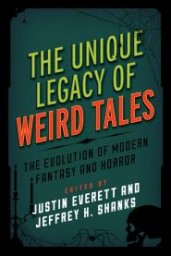A new book of essays was released on October 1st. The Unique Legacy of Weird Tales is the last of Rowman & Littlefield’s Studies in Supernatural Literature volumes. Sunand Tryambak Joshi was the editor of this series that made it to seven before getting the headman’s axe for poor sales. Joshi stated he  had no interest in doing more popular writers such as Stephen King or Dean Koontz. The series might have lasted longer had he done so.
had no interest in doing more popular writers such as Stephen King or Dean Koontz. The series might have lasted longer had he done so.
The books in the series include:
Lovecraft and Influence: His Predecessors and Successors, edited by Robert W. Waugh.
Lord Dunsany, H. P. Lovecraft, and Ray Bradbury: Spectral Journeys, by William F. Touponce.
Critical Essays on Lord, edited by Sunand Tryambak Joshi.
Ramsey Campbell: Critical Essays on the Modern Master of Horror, edited by Gary William Crawford.
Lord Dunsany: A Comprehensive Bibliography, Second Edition, by Sunand Tryambak Joshi and Darrell Schweitzer.
Disorders of Magnitude: A Survey of Dark Fantasy, by Jason V. Brock.
These books go for $80.00 a piece. I doubt local libraries are going to have these in the catalog.
The contents for The Unique Legacy of Weird Tales include:
Introduction: Justin Everett and Jeffrey Shanks
Part 1: The Unique Magazine: Weird Tales, Modernism, and Genre Genre Formation
1. “Something That Swayed as If in Unison”: The Artistic Authenticity of Weird Tales in the Interwar Periodical Culture of Modernism- Jason Ray Carvey
2. Weird Modernisms: Literary Modernism in the First Decade of Weird Tales– Jonas Prida
3. The Lovecraft Circle and the “Weird Class”: Against the Complacency of an Orthodox “Sun-Dweller”- Daniel Nyikos
4. Strange Collaborations: Weird Tales’s Discourse Community as a Site of of Collaborative Writing- Nicole Emmelhainz
5. Gothic to Cosmic: Sword-and-Sorcery Fiction in Weird Tales– Morgan T. Holmes
Part II: Eich-Pi-El and Two-Gun Bob: Lovecraft and Howard in Weird Tales
6. A Nameless Horror: Madness and Metamorphosis in H. P. Lovecraft and Postmodernism- Clancy Smith
7. Great Phallic Monoliths: Lovecraft and Sexuality- Bobby Derie
8. Evolutionary Otherness: Anthropological Anxiety in Robert E. Howard’s “Worms of the Earth” – Jeffrey Shanks
9. Eugenic Thoughts in the Works of Robert E. Howard- Justin Everette
Part III: Masters of the Weird: Other Authors of Weird Tales
10. Pegasus Unbridled: Clark Ashton Smith and the Ghettoization of the Fantastic- Scott Connors
11. “A Round Cipher”: Word-Building and World-Building in the Weird Works of Clark Ashton Smith – Geoffrey Reiter
12. C. L. Moore, M. Brundage, and Jirel of Joiry: Women and Gender in the October 1934 Weird Tales – Jonathan Helland
13. Pscyho-ology 101: Incipient Madness in the Weird Tales of Robert Bloch- Paul W. Shovlin
14. “To Hell and Gone”: Harold Lawlor’s Self-Effacing Pulp Metafiction- Sidney Sondergard
The book comes out at 266 pages, 6.2 x 9.3 inches, 1.2 pounds. $80.00 for hardcover, $55.49 for kindle.
The contents range from sub-genre surveys to literary theory academic wankery. Some of the literary theory essays may not be to everyone’s taste but hopefully the reader may get a take home point or new piece of information. My essay covers the evolution of sword and sorcery fiction in Weird Tales which started out as gothic stories with swords and evolved into its classic form due to the influence of H. P. Lovecraft’s cosmic horror. This is the first academic book on Weird Tales that I am aware of.
Good to see serious appreciation of a serious genre that has not received the respect it deserves. Maybe this will change things.
Is this a second musical youth of Oldfield?
he has not received the respect it deserves.
Some of the literary theory essays may not be to everyone’s taste but hopefully the reader may get a take home point or new piece of information.